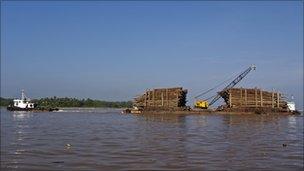Malaysia picks industrialisation over natural treasures
- Published
The forest is dense, impenetrable beyond the cut trail, and the air is thick, hot and humid. What is most astounding is the noise of the insects and birds.
Whistles and clicks and hums, rattles and songs, rising and falling in intensity but always present.
The rainforest of Borneo is said to be the oldest on the planet, 70 million years older than the forest of the Amazon.
There are bright red centipedes and beautiful butterflies. There are crocodiles in the rivers, snakes in the dense bush, macaque monkeys and, at higher elevations, orang-utans.
In just the past few decades, hundreds of species of plants and animals have been discovered on Borneo.
The rainforest is one of the world's great, natural treasures.
Preservation v development
But it is also a national treasure and Malaysia, determined to develop its economy, has choices to make about how to ensure its natural resources pay.
The government has reached a decision - industrialisation is the way forward.
In the state of Sarawak, they are clearing land and pouring concrete for a massive industrial park devoted to heavy industries.
On one site alone, they are looking for foreign investment in steel, aluminium, petrochemicals and glass production.
Further down the coast, there will be other sites for food processing, fish farming, palm-oil production, information technology and, of course, timber.
Greenpeace, the environment campaigners, are amongst those who have raised concerns about how "destructive logging" and other commercial activities in Sarawak are damaging.
Yet, countries from around the world are investing billions of dollars.
To power this industrial site, they have built one massive hydro-electric dam, flooding 700 sq km (270 sq miles) of land and cutting down 230 sq km (90 sq miles) of virgin rainforest.
Another dam is under construction and a third is planned.
"I have never experienced any hydro-power project without someone criticising it," says Sarawak Energy chief executive Torstein Dale Sjotveit.
"This is really valuable to flood it, if you look at the benefits that Sarawak gets from it."
Development benefits

The development of Sarawak is likely to provide a boost to the region's timber industry
That is the choice Malaysia has made. A standing forest does not earn much in the way of revenue.
A little eco-tourism, perhaps, or a few million dollars from the United Nations' scheme to prevent deforestation, cannot compete with the billions of dollars they have already received from foreign investors.
At a place called Samalaju, Adie Abad from the Bintulu Development Authority is escorting some Indian businessmen around the building site that will soon be an industrial park, trying to persuade them to invest, to build a steel works on the site.
Dodging bulldozers and trucks hauling gravel and steel, or diggers clearing the land, Mr Adie has high hopes for this place.
"With the creation of this huge investment coming into this area," he says, "we expect a lot of job opportunities as well as business opportunities for the local, Malaysian people."
"Maybe... in the next five years, you won't see those trees any more."
When asked whether Borneo prides itself on its trees, he says: "We will plant those trees later on - alongside the road, no problem. But we have to give way to the industry to come in."
Mr Adie's boss, the head of the development authority, Mohidin Haji Ishak, says: "Our priority is to have our people enjoy life.
"And, of course, we have a vision to become a developed nation by 2020.
"What we do here is as a result of the demand by the world, you know. We are reacting to the demand. I mean there is money to be made. Why not?"
- Published26 June 2011
- Published4 April 2011